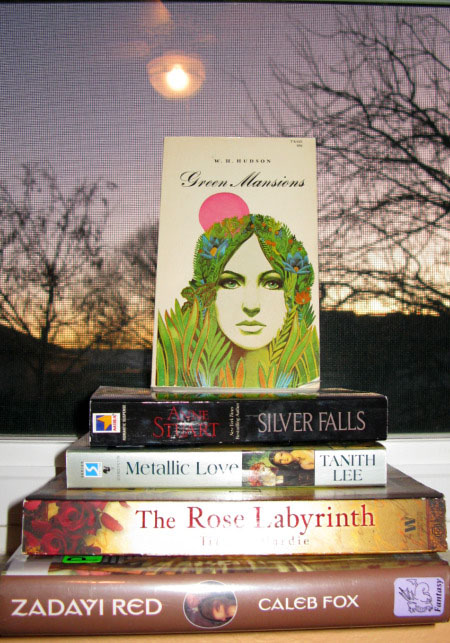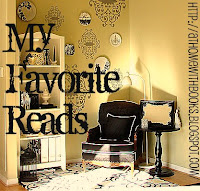Soulless by Gail Carriger*
Source: Once again, the library.
Soulless is an urban fantasy novel with a steampunk twist. And yes, it is as cool as it sounds.
The place is Victorian London, and our noble heroine, Alexia Tarabotti, is settling in at a ball. However, she's not in the ballroom, she's in the library, where she's ordered tea be brought to her. She's about to enjoy her lovely repast when a very rude vampire comes into the room and attacks her! Fortunately for Alexia, she's a preternatural--which means any supernatural creature she touches immediately loses all said powers. Thus Alexia finds it ridiculously easy to stake the poorly-dressed vampire.
This incident spawns a flurry of activity around Alexia. Her nemesis, the head of BUR (can't remember what that stands for at the moment, but it's an agency of supernaturals that polices supernaturals), and the Alpha of the London werewolf pack, Lord Maccon, quickly arrives and the two start squabbling. It's obvious Lord Maccon harbors a deep-seated attraction for Alexia, which Alexia never notices because she believes herself to be completely unattractive and a spinster for life. Beyond that, there's also the question of the vampire--where did he come from? New vampires aren't made every day, and when they are they have to be registered with the BUR. Yet this one wasn't registered. Also, why was he so poorly dressed and what on earth was the butler thinking to let him into the ball?
As I mentioned earlier, this is a very cool, new twist on urban fantasy. I absolutely loved the world Gail Carriger created with Soulless, blending legends about vampires, werewolves, and other supernatural creatures with history in a very clever way. And I love, love, loved the cthulhu shout-out (a secret: octopuses are my favorite animals). Yet the book didn't sustain my interest all the way through, mainly due to two things: Alexia, and the point of view.
Alexia believes herself to be unattractive because her very shallow mother and half-sisters have told her so for as long as she can remember (they are absolutely loathesome characters, btw). Yet Alexia herself judges people based on their appearance all the freaking time. Criticizing the vampire for his shirt was just the first in a long line of such correlations drawn between dress and character. When people are described in this book, there is much attention paid to their attire, whether or not it is appropriate for the time of day and activity, whether it is of good quality, and then the observations move on to their manners and social standing. I know this is supposed to be Victorian Britain, but give me a break! I don't know if Alexia ever judges anyone based on behavior rather than appearance--perhaps Professor
The center of any urban fantasy novel is the kick-ass heroine (or hero, although they tend to be more of the bumbling variety--i.e., Harry Dresden). Alexia is not kick-ass. She behaves with decorum and propriety in almost every situation, and expects others to do the same. The exception is her meetings with Lord Maccon, which take a very unproper turn from the start. Yet even in these encounters, Alexia seemed fairly passive. I would have adored it if Alexia finally grew a spine at some point in the book, but character development doth not exist here. Even after she's been kidnapped and knows she's going to die, she obeys her kidnappers and basically cooperates with them. It's a good thing Lord Maccon was around, or she'd be soulless toast at the end.
That brings me to the point of view. Lord Maccon is a great character, but I didn't need to know what he was thinking in this novel--it was obvious enough without it being spelled out for me. Slowly. Nor did I need to know what Lyall, Mr. MacDougall, Ivy, or the dozens of other secondary characters in this book were thinking. Not only was the switch from one character's viewpoint to another's choppy and unclear, it ruined any and all suspense that might have been derived from the story. We know Maccon is attracted to Alexia, so her not seeing it was simply tiresome. Similarly, I solved the mystery of the poorly-dressed vampire before half of the book was finished. Quite frankly, there is nothing in this book that is not absolutely obvious--no hidden agendas, no twists, no secrets. Even the bad guys are perfectly up-front about what they're doing. If Carriger took on the Victorian obsession with appearances and politeness, why couldn't she have adopted their literary habit of implying the darkest of things without ever saying them? Like Alexia herself, this book seemed very shallow.
There were parts of Soulless that I definitely enjoyed (basically all the scenes with Lord Maccon), but there weren't enough of them for me to like the whole book. I can see why others people liked it--it's definitely likable--but the lack of story telling and characterization beyond clothing put me off, and the hipness quotient wasn't enough to make up for it.
Will I read the second book it the series? Maybe. The world and characters still have potential--but I definitely won't be approaching it with high expectations.
Other opinions:
Babbling About Books, And More!
Monkey Bear Reviews
Book Smugglers (probably the only people who dislike this book as much as I do, aside from Kay at Infinite Shelf)
Booklust
Loves Vampires
Dear Author
E. M. Reads
Angieville
I know a lot of other people have reviewed this book--did I forget to include yours? If so, please let me know in the comments!
*This is NOT an Amazon Associates link. It will take you to the author's website, from whence you can find many links to buy the book.
Powered by ScribeFire.





